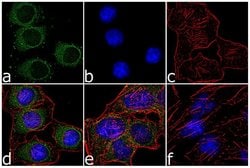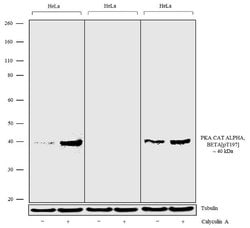Learn More
Invitrogen™ Phospho-PKA alpha/beta (Thr197) Recombinant Superclonal™ Antibody (24HCLC)
Rabbit Recombinant Superclonal Antibody
Supplier: Invitrogen™ 711615
Description
This antibody is predicted to react with Human, Mouse, Monkey, Pig and Bovine Recombinant rabbit Superclonal™ antibodies are unique offerings from Thermo Fisher Scientific. They are comprised of a selection of multiple different recombinant monoclonal antibodies, providing the best of both worlds - the sensitivity of polyclonal antibodies with the specificity of monoclonal antibodies - all delivered with the consistency only found in a recombinant antibody. While functionally the same as a polyclonal antibody - recognizing multiple epitope sites on the target and producing higher detection sensitivity for low abundance targets - a recombinant rabbit Superclonal™ antibody has a known mixture of light and heavy chains. The exact population can be produced in every lot, circumventing the biological variability typically associated with polyclonal antibody production. Note: Formerly called Recombinant polyclonal antibody, this product is now rebranded as Recombinant Superclonal™ antibody. The physical product and the performance remain unchanged.
cAMP is a signaling molecule important for a variety of cellular functions. cAMP exerts its effects by activating the cAMP-dependent protein kinase (AMPK), which transduces the signal through phosphorylation of different target proteins. The inactive holoenzyme of AMPK is a tetramer composed of two regulatory and two catalytic subunits. cAMP causes the dissociation of the inactive holoenzyme into a dimer of regulatory subunits bound to four cAMP and two free monomeric catalytic subunits. Four different regulatory subunits and three catalytic subunits of AMPK have been identified in humans. PRKACB is a member of the Ser/Thr protein kinase family and is a catalytic subunit of AMPK.
Specifications
| Phospho-PKA alpha/beta (Thr197) | |
| Recombinant Superclonal | |
| 0.5 mg/mL | |
| PBS with 0.09% sodium azide; pH 7.4 | |
| P17612, P22694 | |
| PRKACA, PRKACB | |
| Peptide corresponding to Human RSK1, RSK2, RSK3, RSK4 (Chemically synthesized phosphopeptide derived from a region of human PKA that contains threonine 197.). | |
| 100 μg | |
| Primary | |
| Human | |
| Antibody | |
| IgG |
| Western Blot, Immunocytochemistry | |
| 24HCLC | |
| Unconjugated | |
| PRKACA | |
| cAMP-dependent protein kinase C beta; cAMP-dependent protein kinase catalytic beta subunit isoform 4ab; cAMP-dependent protein kinase catalytic subunit alpha; cAMP-dependent protein kinase catalytic subunit alpha, isoform 1; cAMP-dependent protein kinase catalytic subunit beta; cAMP-dependent protein kinase catalytic subunit C alpha; Cs-PKA; PKA C-alpha; PKA C-beta; Pkaca; Pkacb; PKCA1; PKCD; PPNAD4; Prkaca; Prkacb; protein kinase A; protein kinase A catalytic subunit; protein kinase A catalytic subunit beta; protein kinase cAMP-activated catalytic subunit alpha; protein kinase cAMP-activated catalytic subunit beta; protein kinase, cAMP dependent, catalytic, alpha; protein kinase, cAMP dependent, catalytic, beta; protein kinase, cAMP-dependent, alpha catalytic subunit; protein kinase, cAMP-dependent, beta catalytic subunit; protein kinase, cAMP-dependent, catalytic, alpha; protein kinase, cAMP-dependent, catalytic, beta; sperm cAMP-dependent protein kinase catalytic subunit | |
| Rabbit | |
| Protein A | |
| RUO | |
| 5566, 5567 | |
| Store at 4°C short term. For long term storage, store at -20°C, avoiding freeze/thaw cycles. | |
| Liquid |
Safety and Handling
Your input is important to us. Please complete this form to provide feedback related to the content on this product.

